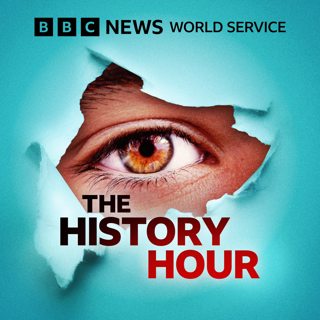
Apollo 8
At Christmas 1968, the biggest audience in TV history watched NASA's Apollo 8 mission beam back the first pictures from an orbit around the Moon. The broadcast captured the world's imagination and put America ahead of the Soviet Union in the Cold War battle to make the first lunar landing. Plus, the rape of Nanking, WWII spy drama in the Netherlands and the woman who revolutionised the treatment of the dying.Picture: The Earth as seen from the Moon, photographed by the Apollo 8 crew (NASA)
15 Dec 201850min

Adopted By The Man Who Killed My Family
A child survivor of a Guatemalan army massacre during the country's brutal civil war, the women who cleared up post war Berlin, plus Armenia's 1988 earthquake, how Bokassa became Emperor of the Central African Republic, and Angela Merkel's rise to power. Photo: Ramiro as a child in Guatemala (R.Osorio)
8 Dec 201850min

The Man Who Inspired Britain's First Aids Charity
The first man in Britain to die of AIDS, whale hunting in the South Atlantic in the 1950s, how Norway voted not to join the EU, the American adventurer who inspired the Indiana Jones stories, and Saddam Hussein's draining of Iraq's southern marshes in a bid to flush out his opponents.Picture: Terrence Higgins (Courtesy: Dr Rupert Whitaker)
1 Dec 201850min

The 'Braceros' - America's Mexican Guest Workers
From 1942 to 1964 the US actively encouraged American farmers to hire tens of thousands of migrant workers to come to work legally from Mexico - they were known as 'braceros'; also, when Moscow invited thousands of foreign students to attend an International Youth Festival in the former USSR; a witness to the funeral of the Duke of Wellington; plus Arafat's final weeks and why was JKF's killer allowed to defect to the Soviets?Photo: A group of Mexican Braceros picking strawberries in a field in the Salinas Valley, California in June 1963 (Getty Images)
24 Nov 201850min

Japanese Murders in Brazil
How Japanese immigrants in Brazil fell out with each other after the end of the WW2, how Britain helped to get disabled people on the road in the 1940s plus life for Jews under Imperial Russia, the victims of Brazil’s military dictatorship in the 1970s and the American embassy hostage crisis in Tehran.
17 Nov 201850min

The End of World War One
11th November 1918 saw the end of a four year war that had killed an estimated 20 million soldiers and civilians around the world. We hear eyewitness accounts of the conflict which was fought by many nations, on many continents. The historian, Professor Annika Mombauer joins Max Pearson to discuss the devastating war that changed the world. Photo: Crowds in London celebrate the signing of the Armistice on 11th November 1918 (Topical Press Agency/Getty Images)
10 Nov 201851min

When Russia's Richest Man Was Jailed
Russia's struggles with big business, when Nigeria struck oil, why Maximilian Kolbe was made a saint, the London arrest of Chilean dictator Augusto Pinochet and Desmond Tutu.Photo: former head of Yukos Mikhail Khodorkovsky leaving the courtroom in Moscow, Russia, September 22, 2005. Credit: Sovfoto/UIG via Getty Images
26 Okt 201850min

The Nazi Black Book
The Nazi black book, a list of those to be arrested and dealt with if Germany occupied Britain, privation in wartime and Allied-occupied Austria, racial tension in 1940s Sweden, plus how Britain's Labour party moved against hereditary peers in the House of Lords in the 1990s.
26 Okt 201849min






















